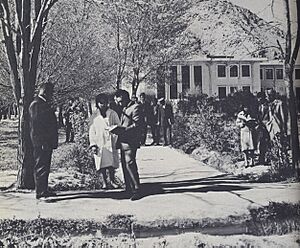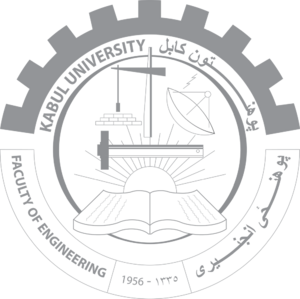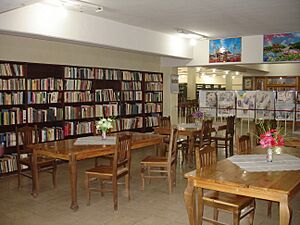Kabul University facts for kids
|
دانشگاه کابل / د کابل پوهنتون
|
|
 |
|
| Motto | Excellence in Service to Afghanistan |
|---|---|
| Established | November 1932 |
| Chancellor | Osama Aziz |
| Students | 22,000 |
| Location |
,
Afghanistan
|
| Nickname | KU |
Kabul University (KU) is one of the most important and oldest universities in Afghanistan. It is located in Kabul, the capital city. The university was started in 1932 by King Mohammed Nadir Shah. About 22,000 students attend Kabul University. Before August 2021, almost half of the students were girls.
Contents
History of Kabul University
Kabul University officially opened its doors in 1932. It welcomed students from all over Afghanistan. The university received help from countries like Turkey, France, Germany, and the United States.
Early Years and Growth
The first part of the university was the Faculty of Medicine. It was set up in 1932 by Turkish professors. They also built the first teaching hospital, Aliabad Hospital. In 1936, the Faculty of Law & Political Sciences was added.
Turkish professors taught at Kabul University from 1932 to 1952. The first leader of the university was a Turkish surgeon named Urga. He taught medicine for 17 years. At first, only male students could attend. But in 1950, girls were also allowed to study there.
In the 1960s, many scholars who had studied abroad came to teach. Famous students from this time included Ahmad Shah Massoud and Gulbuddin Hekmatyar. The university was a place where many different political ideas were discussed.
During a time of civil unrest, many teachers and staff left Kabul University. The area around the university became a battleground in the Afghan Civil War (1992–1996).
Rebuilding After 2001
After the Taliban government was removed in late 2001, people focused on rebuilding education in Afghanistan. By 2004, the university had only 24 computers. Kabul University started working with foreign universities like Purdue University.
The Information Technology Center was created in 2002. This helped improve technology at the university. The number of students in higher education grew a lot across Afghanistan. By 2008, Kabul University had 9,660 students. About 2,336 of them were women.
In 2007, Iran gave money to the university's dentistry department. They also donated 25,000 books. The main library was built with help from the United States. It has computers, books, and magazines. Nancy Dupree was the director of the Afghanistan Center at the university.
In 2008, the university campus got a local computer network. All buildings were connected to the internet. This helped students and teachers with their studies.
In 2019, a car bomb exploded outside the university. It caused harm to several people. In November 2020, gunmen attacked the university. This event resulted in many deaths and injuries. Afghan and American forces responded to the attack.
Recent Developments (Since 2021)
After the Fall of Kabul (2021), the Taliban took control of the university. They changed the university's leader. Many teachers resigned because of these changes. The new leader stated that women would not be allowed to attend until a proper Islamic environment was ready.
In October 2021, a new chancellor, Osama Aziz, was appointed. He has a doctorate in Islamic law. Classes at the university were stopped for a while.
Kabul University reopened on February 26, 2022. Female students attended in the morning and male students in the afternoon. The music department was closed, but other subjects remained similar.
However, in December 2022, Kabul University stopped women from attending. This was part of a wider ban on women's education by the Taliban. In March 2023, women protested this ban by reading books outside the university.
University Structure
Kabul University has many different faculties, which are like schools within the university. Each faculty has several departments.
- The Faculty of Environment Science has departments for environmental protection, natural resources, and disaster management.
- The Faculty of Law and Political Sciences includes departments for public law, criminal law, private law, and international relations.
- The Faculty of Computer Science has departments for software engineering, computer science, information technology, and information systems.
- The Faculty of Economics offers studies in finance, enterprise management, and national economies.
- The Faculty of Science covers biology, mathematics, chemistry, and physics.
- The Faculty of Engineering has departments for mechanical, electrical, architectural, energy, civil, and urban planning engineering.
- The Faculty of Pharmacy has five departments and eight laboratories. About 400 students study there.
- The Faculty of Agriculture includes departments like agronomy, animal sciences, and horticulture.
- The Faculty of Veterinary Medicine focuses on animal health and food hygiene.
- The Faculty of Journalism has departments for radio & TV and press.
- The Allama Iqbal Faculty of Arts was built in 2010 with help from Pakistan. It has classrooms, seminar halls, a library, and computer labs.
- The Faculty of Language and Literature teaches many languages. These include Pashto, Dari, English, Russian, German, Turkish, French, Arabic, Spanish, and Chinese.
- The Faculty of Fine Arts has departments for sculpture, painting, graphic design, theatre, music, and screenwriting.
- The Faculty of Islamic Studies covers religious law, philosophy, and Islamic culture.
- The Faculty of Social Science includes archaeology, anthropology, philosophy, and history.
- The Psychology and Educational Science Faculty has departments for education, psychology, and management.
National Centre for Policy Research
The National Centre for Policy Research was created at Kabul University in 2003. It works with the Ministry of Higher Education. This center helps study and develop policies for Afghanistan.
University Library
In 1992, the university library had 200,000 books and many old writings. During the civil war, many of these valuable items were lost or damaged. The library also served as Afghanistan's National Library.
Famous People from Kabul University
Many important people have studied or taught at Kabul University. Some of them include:
- Mohammad Yusuf, a former Prime Minister of Afghanistan.
- Hafizullah Amin, a former head of state in Afghanistan.
- Babrak Karmal, a former President of Afghanistan.
- Mohammad Najibullah, another former President of Afghanistan.
- Burhanuddin Rabbani, also a former President of Afghanistan.
- Ahmad Shah Massoud, a well-known Afghan leader.
- Nancy Dupree, an American archaeologist.
See also
 In Spanish: Universidad de Kabul para niños
In Spanish: Universidad de Kabul para niños
- Education in Afghanistan
- List of universities in Afghanistan
 | Toni Morrison |
 | Barack Obama |
 | Martin Luther King Jr. |
 | Ralph Bunche |



